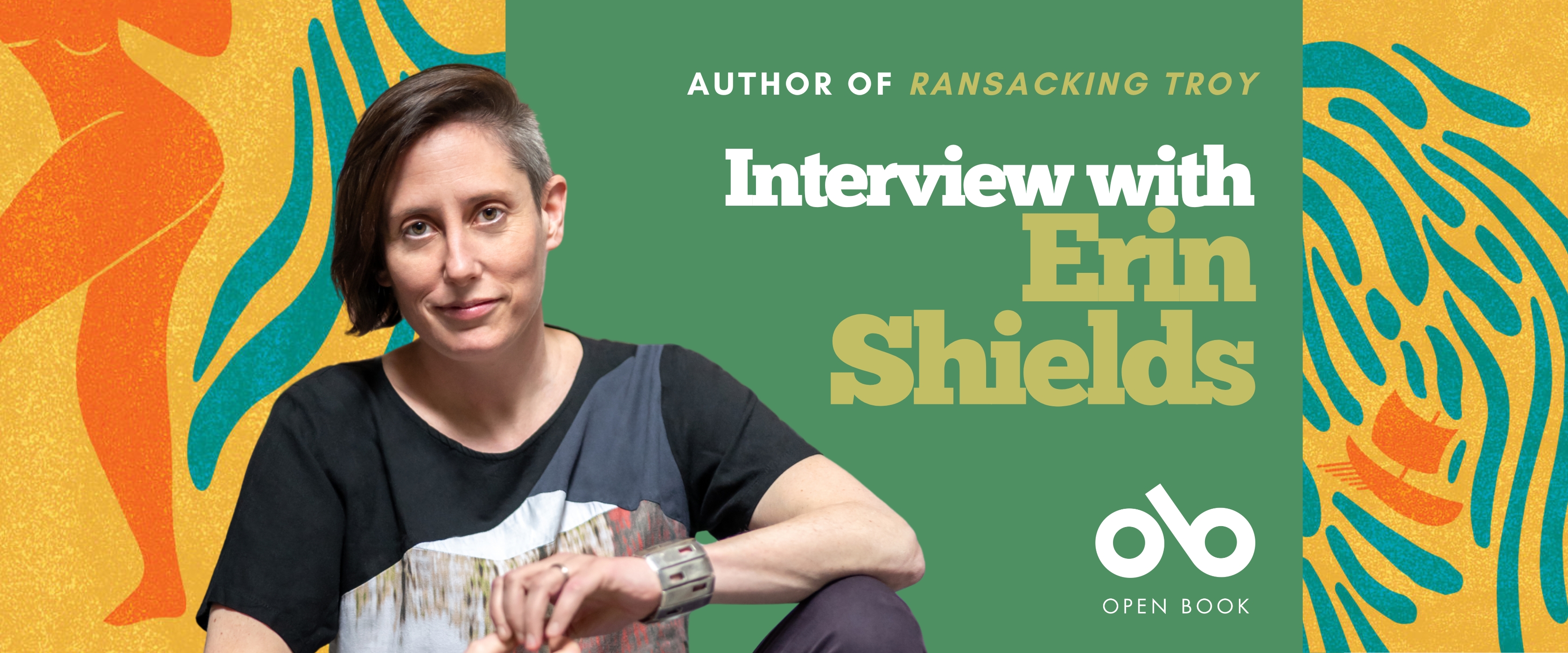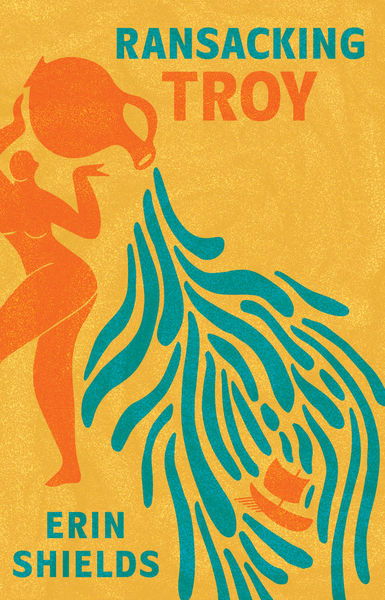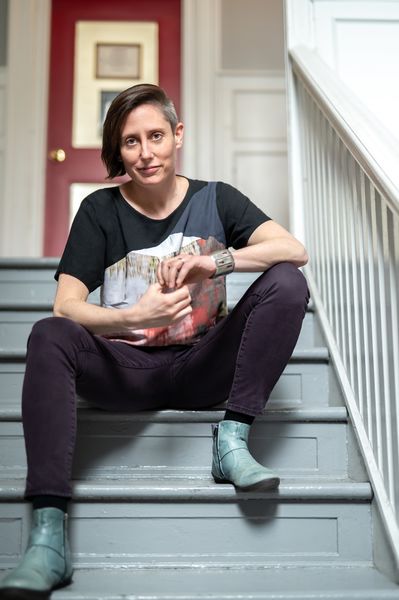Electrifying Playwright Erin Shields Flips the Script on Homer and Virgil in RANSACKING TROY
In Ransacking Troy, award-winning playwright Erin Shields flips the script on the Trojan War with a fierce, feminist retelling that gives long-silenced voices the spotlight they deserve. Tired of waiting for the men to return from battle, Penelope, Clytemnestra, and a fearless crew of Grecian women set sail to end the war themselves. From battling mythical beasts to defying the gods, these women are not background players—they’re the heroes of the story.
Epic, urgent, and electrifying, Ransacking Troy reimagines Homer’s and Virgil’s legends with blazing originality and a bold call for change.
Check out our feature Behind the Curtain interview with the author as she dives into the inspiration behind this radical reworking of classical myth, and shares what it means to write a war story where women lead the charge—and rewrite history.
Open Book:
How did this play first come to life for you? Do you remember the first bit of writing you did for it?
Erin Shields:
I started dreaming of Ransacking Troy as my play, Paradise Lost, was hitting the stage at The Stratford Festival in 2018. When a play opens, that’s it for the writer and director. It belongs to the actors, technicians and stage management from that moment on so I think my writer-brain was trying to find a way to come back to that amazing place, The Stratford Festival.
I told the director of Paradise Lost, the incredible Jackie Maxwell, about my idea for a new play. I had been obsessed with the entire universe of Greek Mythology for years and was circling around a play about the women involved in the Trojan War. Jackie nodded and smiled sensing, I think, that I had it in my mind to write another HUGE play. As an opening-night gift for Paradise Lost, Jackie gave me a copy of Homer’s The Odyssey freshly translated by Emily Wilson. As I began to read Wilson’s vibrant translation of Homer’s extraordinary poem, the pieces started to come together in my mind.
Now, seven years later, Jackie Maxwell is in the midst of the Herculean task of directing my HUGE play, Ransacking Troy. I wonder what book she’ll give me as an opening-night gift?
OB:
Was there a question you were exploring in this work, and if so, did you know what it was when you started writing?
ES:
There were two big questions that guided this play. The first launches the action of the story: What if the women of Greece got tired of waiting for their men to come home from the Trojan War so set out to end the war themselves?
Your CanLit News
Subscribe to Open Book’s newsletter to get local book events, literary content, writing tips, and more in your inbox
The second question was slightly more philosophical. In 2019 we were right in the middle of the #metoo movement. Women in every industry were refusing to be victims of powerful men, telling their stories with conviction and toppling the once-unquestioned Titans of our time. There was a feeling of accomplishment: justice had prevailed and everything would change. My question at the time which became central to Ransacking Troy, a question I am still grappling with today, is: Once you have upended the balance of power, how do you bring about meaningful, systemic and lasting change?
OB:
Did the script change in any way once you were rehearsing?
ES:
The script is ALWAYS impacted by the actors. As they are making their way from one moment to the next, they filter the life experience and ongoing journey of their character through their own body and life experience. I can see when the moments I’ve written click very naturally with the actor and the moments where they butt up against something. That something could be a line of text or a choice a character makes that doesn’t feel quite right. Often, the actor just needs to find their way through it because I’ve (very cleverly) written that friction for their character to grapple with. Occasionally (okay, more than occasionally) the actor is right that something in the text needs to change. While they don’t always know what “the fix” should be, they are very good at finding the problems!
OB:
Which of your characters do you feel most connected to in this work, and why?
ES:
I sort of fall in love with all the characters as I write. Especially as the actors start to inhabit them. For a play inspired by a foundational text (in this case the Odyssey, Iliad and many Greek plays), there are two types of characters: characters who are part of the original story and those I invent to make the original speak more directly to our time. Penelope (wife of Odysseus who famously waits twenty years for him to come home while cleverly fending off suitors) is in the former category. I found great pleasure in extending the character Homer paints – a woman who is wise, loyal and steadfast – by adding in a healthy dose of impatience, humour and a reckless belief that the women of Greece are capable of bringing an end to the Trojan War.
As there are very few working-class characters in the narratives surrounding the Trojan War and next to no queer characters, I felt it essential to invent a shipwright named Cur. Cur is an incredible builder, an optimistic doer and falls deeply in love with Hermione, Helen’s daughter, who is also part of this band of adventurers. It’s so much fun to write a character like Cur who is new to this story but feels like she was absolutely there in Bronze-Age Greece when this story was happening.
OB:
In your opinion, how does one go about writing great and memorable characters for the stage?
ES:
Give them a strong goal that is almost impossible to achieve. Give them a character fault that makes them get in their own way. Make them very knowledgeable and/or passionate about one thing.
OB:
Are there any misconceptions about being a playwright?
ES:
Often people assume that I have a fixed vision for what the play will look like when it gets to the stage. That I SEE it as I write, like a movie in my mind, and have very specific idea of how it should all come together. I get asked about how scary and threatening it must be to “hand it over” to a director. For me, a playscript is the first act of obsession. I get obsessed with something – a story, a character, an idea – and create the blueprint for the piece of theatre. Yes, I write the words and envision the play moving from one moment to the next on a stage, but HOW that will all happen and come together remains an exciting mystery to me. I write very few stage directions to purposefully leave room for the director, actors and designers to bring their artistry to the work. I invite them into the obsession. That’s how the magic happens.
OB:
Do you feel your work has changed in any way through your writing life and career? If so, how?
ES:
I feel so much more confident in my craft than I did when I started out. I have developed a process that I can rely on to bring a play from first idea to opening night. I also understand everyone else’s roles so much better that I instinctually know how an actor will understand a character or the director can move the action from one scene to the next.
OB:
How would you define the role of theatre in society?
ES:
At its best, theatre has the ability to crack open our daily armour and give us access to parts of ourselves that usually go untouched. It can force us to reckon with the most chaotic, complicated truths of our time. In my theatre I want poetry, humour, surprise, magic, beauty, catharsis, argument, music, entertainment, visceral-gut-wrenching-transformation, and, most of all, energy.
_______________________________
Erin Shields is a Canadian playwright best known for radical adaptations of classical texts that bring neglected female characters centre stage. Her additional text for Shakespeare’s Much Ado About Nothing at the Stratford Festival gives a voice to silenced Hero at the climax of the play. Queen Goneril, which premiered at Soulpepper Theatre in rep with King Lear, centres Lear’s stifled daughters as they contend for power in a world that insists they remain powerless. Erin’s illuminating and hilarious adaptation of Paradise Lost (Stratford Festival) won the Quebec Writers' Federation Prize for Playwriting. And her harrowing tragedy about sexual violence, If We Were Birds, won the Governor General’s Literary Award for Drama. You can read more about past and upcoming projects on her website, www.erinshields.ca.







